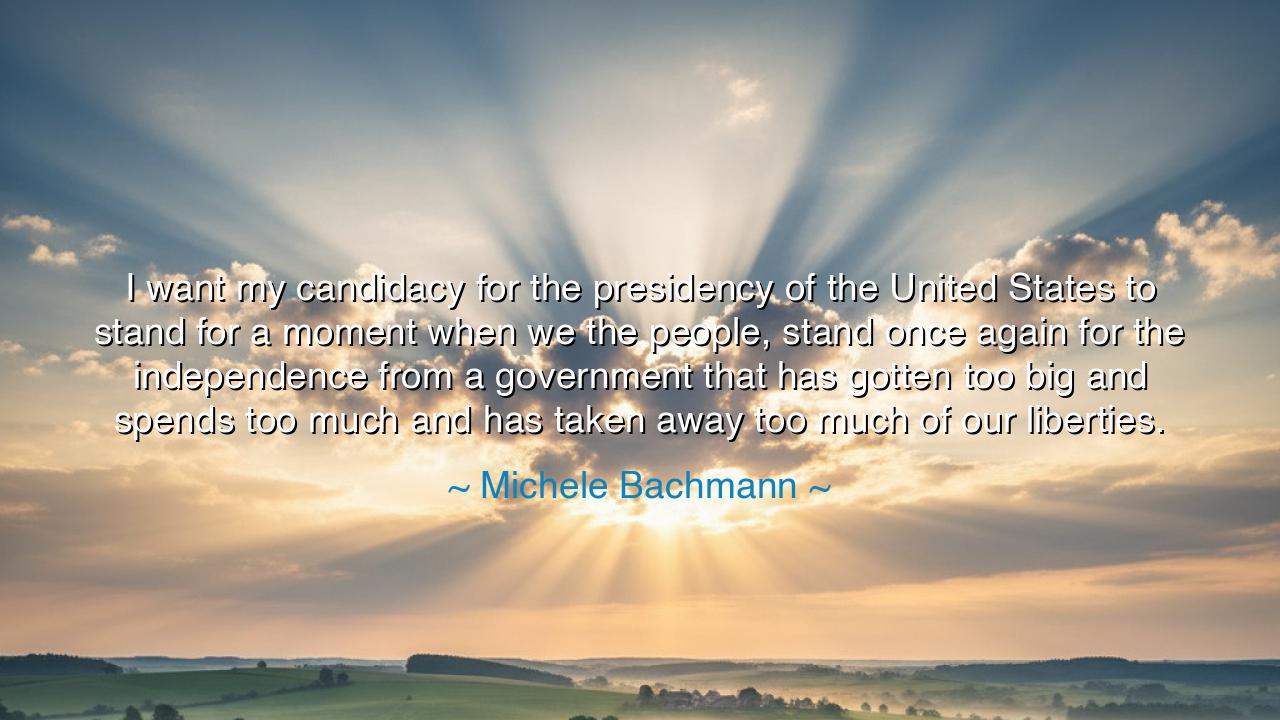
I want my candidacy for the presidency of the United States to
I want my candidacy for the presidency of the United States to stand for a moment when we the people, stand once again for the independence from a government that has gotten too big and spends too much and has taken away too much of our liberties.






Hear the voice of Michele Bachmann, who once spoke in the spirit of rebellion and remembrance, saying: “I want my candidacy for the presidency of the United States to stand for a moment when we the people, stand once again for the independence from a government that has gotten too big and spends too much and has taken away too much of our liberties.” These words are not merely the cry of a politician; they are the echo of an ancient struggle—the eternal conflict between freedom and control, between the governed and the governors. Her declaration calls upon the oldest flame in the American heart: the flame of independence, first kindled in the year 1776, when a people dared to stand against the weight of kings.
For in the beginning, when this nation was born, it was not born from comfort but from resistance. The Declaration of Independence was not a document of ease, but a shout of defiance—an affirmation that no government, however mighty, should crush the will or the dignity of its people. Bachmann’s words are a reflection of that same spirit, spoken centuries later, in a time when the instruments of power had grown vast, and the people’s faith in their rulers had begun to wane. In her eyes, the modern state had become a Leviathan—too big, too costly, and too quick to take from the people what once belonged to them: their liberty.
This tension between liberty and authority is as old as civilization itself. The ancients of Greece knew it well. When Pericles warned that democracy could become tyranny under the weight of its own laws, he spoke of the same danger Bachmann saw: that government, born to serve, may in time seek to command. The Roman Republic, too, fell not to foreign swords but to its own excess—its armies paid by taxes that crushed the citizen, its senators drunk on luxury and control. From those ashes rose an empire, powerful yet enslaved by its own abundance. Thus, history whispers its warning: when the state grows greater than the spirit of its people, freedom falters.
Bachmann’s plea is for a return—not to chaos or rebellion, but to balance. She speaks of independence not as separation from law, but as restoration of proportion. The government, she reminds us, is a creation of the people, not their master. When it takes more than it gives, when it spends beyond its means, when it demands obedience instead of earning trust—it strays from the vision of the founders, who built a nation upon the sacred principle that power must always answer to the people who grant it.
But her words also carry a challenge—a challenge not only to leaders, but to citizens. For government grows large not merely through tyranny, but through the complacency of those who no longer guard their freedom. The ancients knew this truth: a people who surrender their vigilance will soon surrender their rights. When the citizen says, “Let the state care for me,” he trades the hard-earned coin of liberty for the soft cushion of dependence. And thus, the spirit that once fought for independence becomes bound once more, not by chains of iron, but by comfort and indifference.
Consider the tale of the American Revolution, when farmers, merchants, and scholars—men and women of ordinary station—rose to defy the most powerful empire on earth. They did not fight for wealth or conquest, but for the simple right to govern themselves. They risked ruin so their descendants could live unshackled. Bachmann’s words summon that same spirit: that the defense of freedom is not a task finished long ago, but a duty renewed with every generation. For the enemies of liberty do not always come with armies—they come with laws, taxes, and promises too sweet to refuse.
Let this then be the lesson: freedom requires restraint—of power, of desire, of excess. The greatness of a nation lies not in the might of its rulers, but in the virtue and vigilance of its citizens. Each person must be the guardian of their own independence, resisting the slow erosion of rights that comes from apathy and fear. Stand watch over your freedoms as the ancients guarded their temples, for once desecrated, they are not easily restored.
And so, as Bachmann declared, let each generation seek its own moment of independence—not with rebellion, but with remembrance; not with anger, but with action. Live with courage, speak with truth, and hold your leaders to account. For government must serve, not rule; it must protect, not possess. And if ever it forgets this sacred duty, then it is the task of the people—the heirs of freedom—to remind it once again that liberty is not granted by rulers, but born in the hearts of those who will not bow.






AAdministratorAdministrator
Welcome, honored guests. Please leave a comment, we will respond soon